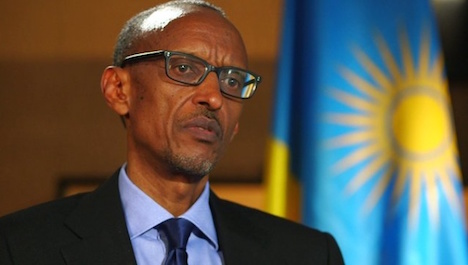|
By Justin Podur, teleSUR
teleSUR
Wednesday, Nov 18, 2015
 |
| Rwanda President Paul Kagame can now breathe easier. | Photo: Reuters |
Spain has struck down its case against Rwanda and the doctrine that once kept war criminals awake at night.
At the beginning of October, Spain's supreme court dismissed the case known to Rwanda watchers as the Merelles (2008) indictments. Judge Andreu Merelles had charged forty Rwandan military officials of crimes against humanity, war crimes, terrorism, and genocide, and issued warrants for their arrest. The indictment was launched because some Spanish citizens had been killed in the Rwandan civil war. But it expanded to include Rwandan and Congolese victims of the armed forces of Paul Kagame, the winner of the 1990 civil war and the man who may have just become Rwanda's President-for-life (more on that below).
The indictments had always excluded Kagame because of Kagame's presidential immunity. Kagame went about protecting himself in two ways, both of which eventually succeeded. First, Kagame may have reasoned, if the president is immune to prosecution, why not stay president forever, making whatever constitutional changes necessary to do so? Second, the indictments themselves were challenged and the doctrine underlying them, ultimately defeated.
The doctrine in question was called “universal jurisdiction.” The idea was that a crimes like genocide and crimes against humanity were not crimes that stopped at national borders. As a result, any country could charge and try those accused of such crimes, even if they were from another country. Universal jurisdiction is a liberal doctrine, analogous to the selectively applied Responsibility to Protect (R2P). Universal jursidiction is not as prone to abuse as R2P mainly because it is not as asymmetric as R2P: any country with a judiciary can hold a trial and issue arrest warrants, but only two or three countries in the world have the military might to send military forces to other countries, whether on the pretense of protecting people or some other. For non-superpowers, for smaller countries, there was only the threat of the law.
Spain was just such a small country whose judges took up the law against human rights abusers in other countries. Under the universal jurisdiction doctrine it attempted to try Chile's dictator Augusto Pinochet, Guatemalan military officers, and Argentinian military officers. But the Spanish judges didn't just chase fallen dictators from smaller countries. They also pursued former US Secretary of State Henry Kissinger, US soldiers for crimes in Iraq, Chinese politicians for crimes in Tibet, and Israeli generals for massacres of Palestinians.
By going after the big fish and people currently in power, the Spanish judges set alarm bells ringing. Israel, which famously used the doctrine of universal jursidiction in its trial of Eichmann 1961, got the investigation against its officers stopped. Kissinger argued that the doctrine would degenerate into show trials against political opponents.
Last year, Spain's legislature reduced the applicability of universal jurisdiction. A New York Times article (Feb 10/14, “Spain Seeks to Curb Law Allowing Judges to Pursue Cases Globally”) suggests that China was the last straw. But the doctrine was targeted earlier. And the last straw was not China, but the arrest in June of one of Rwandan ruler Kagame's intelligence officers, Karenzi Karake, in London, on a European arrest warrant filed based on Merelles's 2008 indictments. Karake was released in August through the strenuous efforts of the Blair family (Tony Blair is a friend and advisor to Kagame, and Cherie Blair was Karake's lawyer). Less than two months later, Merelles's indictments were dismissed in the Spanish Supreme Court.
Kagame and his men could breathe a little easier. As for Kagame himself, lest any other countries get any universal jurisdiction ideas, the Rwandan parliament voted to allow Kagame to extend his tenure beyond the end of his term limits in 2017. Maybe he'll stay on until 2034. The parliament didn't change the law for everyone: just for Kagame.
Is anything left of the indictments? For 29 of the 40 indicted, there remains a possibility of prosecution should they enter Spanish territory.
But the doctrine on which it is based, universal jurisdiction, has been eroded. Journalist Judi Rever, describing the case in the Digital Journal, used the term “gutted.” After this decision, the international legal arena has become a bit safer for war criminals.
Partial justice and victor's justice will still take place through these international tribunals. If you are a dictator, if you lose a war, if you end up on the wrong side of Western weapons - you should continue to fear trial and execution in international courts.
But if you are perpetrating crimes against Asians or Africans, in places like Rwanda or the DRC, or in Palestine or Afghanistan or Iraq, under the protection of a major power like the U.S. – well then, rest easy. The law will not get you.
Source URL
|
 Print This Print This

|

